Football/Soccer Session (Moderate): Day 2: passing angles, receiving with back foot, etc... (Start Time: 16-Feb-2016 09:40h)
Profile Summary

| Name: | Todd Ledbetter |
|---|---|
| City: | Chattanooga |
| Country: | United States of America |
| Membership: | Adult Member |
| Sport: | Football/Soccer |
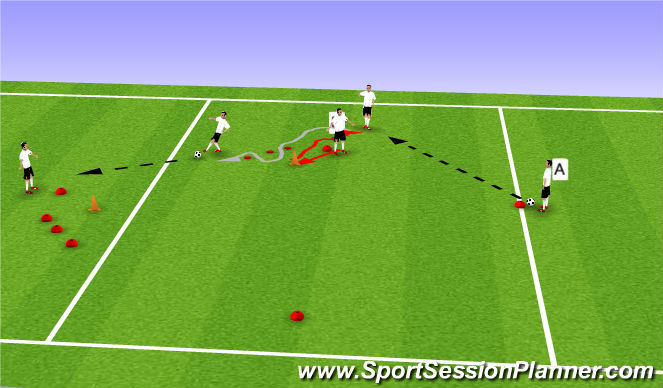
See the guidance at the top of this page to understand why you are not seeing interactive Football/Soccer images.

Screen 2 (15 mins)
Diamond Passing Drill. Working on reciving the ball at proper angles and with the back foot.
Progression 1: Player 1 starts with ball, player 2 checks to the cone, then moves at an angle to receive the ball. After recieving the ball they dribble through the cones (simulating escaping pressure), then pass to next player. The pattern contiues for about 3 minutes. We will then move the cones and they will do the same movement to the opposite direction.
Coaching Points: 1) The timing of when the receiver shows. 2) The receiver MUST check away and then into the space that they want. 3) Do the work to receive with the back foot so that their bodies will be open to the field. 4) Is the receiving player "checking his shoulder" before receving so that he knows what's next? 5) Is the receiver taking his touch towards his next pass? 6) Coach speed of play. A) What is slowing the player's ability to make the accurate pass? Angle of first touch, poor first touch, too many steps in b/t receiving and playing, etc...7) Is the passing player playing to the correct foot?
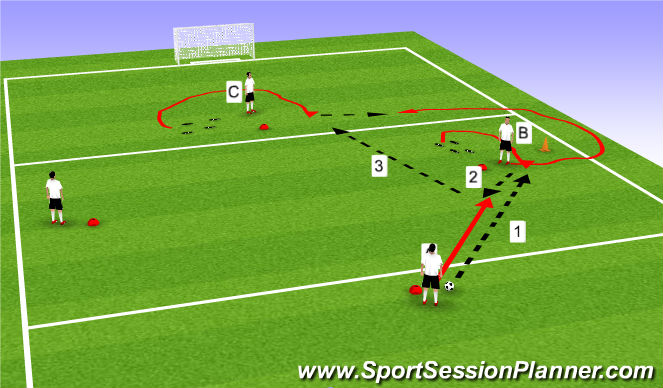
See the guidance at the top of this page to understand why you are not seeing interactive Football/Soccer images.

Screen 3 (20 mins)
Progression 2: Combination Play: A will play to B. B will play "the way he is facing" back to A and then back out with his body open to the field to give a better passing angle to A. A will then play a penetrating pass to C. B will IMMEDIATELY support the penetrating pass. C will play "the way he is facing" back to B, etc... Play should be 1 or 2 touch whenever possible. DO NOT risk turning over possession if you know that you can't play 1 touch. BUT why take 2 touches if it couldve been done in 1?
Coaching Points: 1) The timing of when the receiver shows. 2) The receiver MUST check away and then into the space that they want. 3) Are the players keeping the ball on the ground? 4) Is the player doing the work AFTER playing the way he was facing to provide space and a good passing angle for the player while keeping his body open to the field? 5) Coach speed of play. A) What is slowing the player's ability to make the accurate pass? Angle of first touch, poor first touch, too many steps in b/t receiving and playing, etc...6) Is the passing player playing to the correct foot?
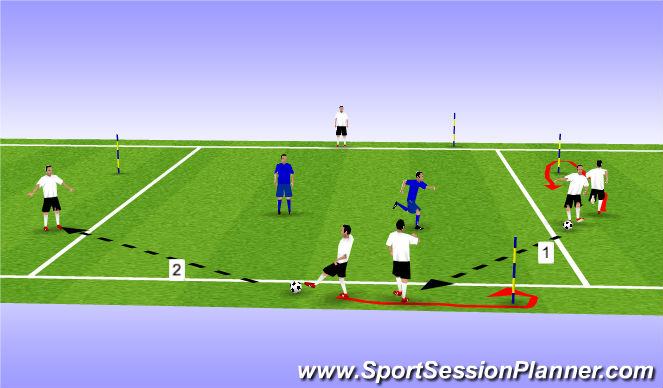
See the guidance at the top of this page to understand why you are not seeing interactive Football/Soccer images.

Screen 4 (20 mins)
4 v 2 Possession: 12x12 Groups of 6. 2 touch.The Att players must stay on or behind their line. The offensive players should be checking at angles and looking to receive the ball with their back foot. If the player gives up possession, they are now D. Players should constantly be working in the seam or window to provide an option for the penetrating pass that will split the D. Progression: After a pass is made, the offensive player must check around a pole that is behind them. Play should be 1 or 2 touch whenever possible. DO NOT risk turning over possession if you know that you can't play 1 touch. BUT why take 2 touches if it couldve been done in 1?
Coaching Points: 1) Are the angles as good as they could/should be. Do net let this go. Over coach this. 2) Are the players receiving with their back foot to open up their bodies, giving them more options to get out of pressure? 3) Are players working in windows/seams to be an option for the split? If an Att. player splits the D and there is no one their to receive it, the player that should have been their will go in the middle. 4) How's communication? 5) Does the receiving player "have a plan" BEFORE receiving the ball? 6) Are defenders communicating? This is a perfect time to touch on pressure/cover. 6) Coach speed of play.
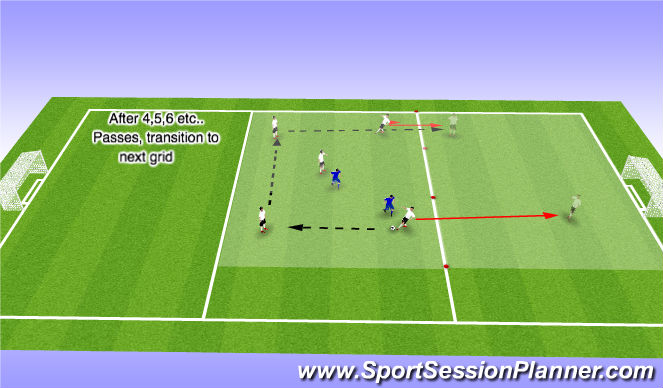
See the guidance at the top of this page to understand why you are not seeing interactive Football/Soccer images.

Screen 5 (20 mins)
5 v 2 with Transition: 15 x 10 Groups of 7. 2 touch. The Att players are now inside their grid. The offensive players should be checking at angles and looking to receive the ball with their back foot, keeping the grid as big as possible. If the player gives up possession, they are now D. Players should constantly be working in the seam or window to provide an option for the penetrating pass that will split the D. Play should be 1 or 2 touch whenever possible. DO NOT risk turning over possession if you know that you can't play 1 touch. BUT why take 2 touches if it couldve been done in 1?
Coaching Points: 1) Are the angles as good as they could/should be. Do net let this go. Over coach this. Supporting players can not get "ball watchy!"2) Are the players receiving with their back foot to open up their bodies, giving them more options to get out of pressure? 3) Are players working in windows/seams to be an option for the split? If an Att. player splits the D and there is no one their to receive it, the player that should have been their will go in the middle. 4) How's communication? 5) Does the receiving player "have a plan" BEFORE receiving the ball? 6) Are defenders communicating? This is a perfect time to touch on pressure/cover. 7) Coach Speed of Play. 8) Make sure ATT players are using every inch of avaliable space to give themselves more time on the ball.
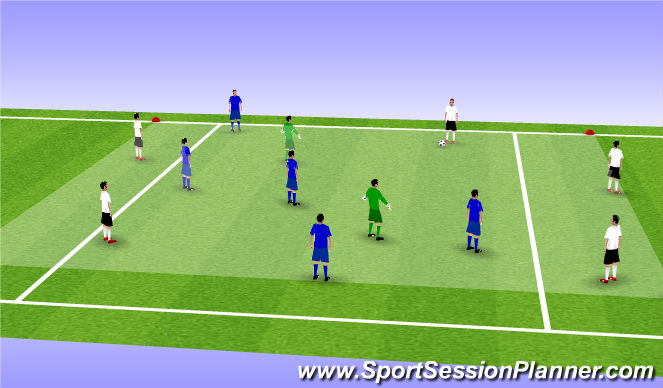
See the guidance at the top of this page to understand why you are not seeing interactive Football/Soccer images.

Screen 6 (20 mins)
Simple Non- Directional Possession: 5 v 5 + 2. The whole goal of this exercise is to keep possession of the ball. Hopefully, we will implement what we have learned in all previous exercises so that we do not give up possession unnecessarily. 7 consecutive passes = 1 goal. Unlimited touch (7m) 2 touch (10m)
Coaching Points: 1) Are the angles as good as they could/should be. Do net let this go. Over coach this. Supporting players can not get "ball watchy!"2) Are the players receiving with their back foot to open up their bodies, giving them more options to get out of pressure? 3) Are players working in windows/seams to be an option for the split? If an Att. player splits the D and there is no one their to receive it, the player that should have been their will go in the middle. 4) How's communication? 5) Does the receiving player "have a plan" BEFORE receiving the ball? 6) Are defenders communicating? This is a perfect time to touch on pressure/cover. 7) Coach Speed of Play. 8) Make sure ATT players are using every inch of avaliable space to give themselves more time on the ball.
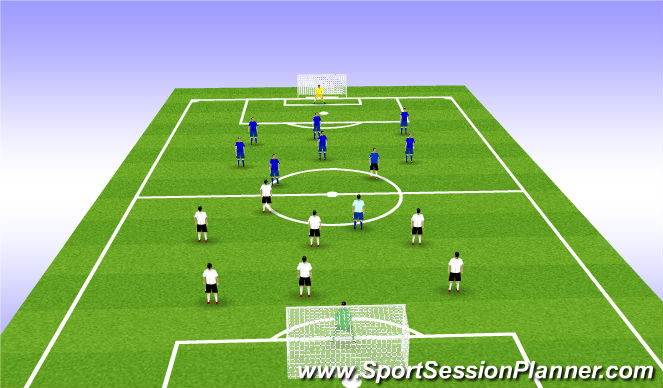
See the guidance at the top of this page to understand why you are not seeing interactive Football/Soccer images.

Screen 7 (20 mins)
8v8 to Big Goals. 8 passes=2 Goals,Score on Big Goals=1 goal.







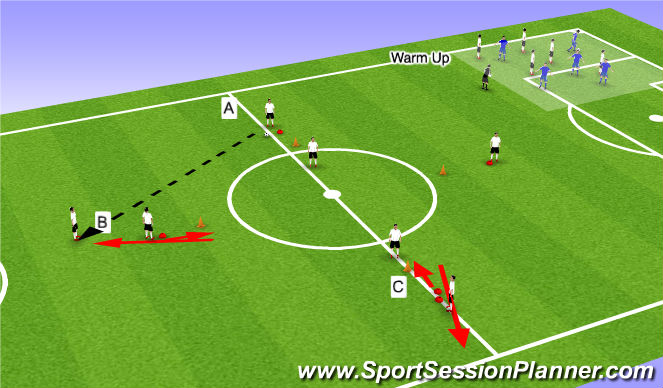
 Play animation
Play animation Play step-by-step
Play step-by-step Repeat (toggle)
Repeat (toggle) Full Screen
Full Screen Pause
Pause Stop
Stop
Screen 1 (20 mins)
3 Ball: 5 v 5. Each team starts out with a ball. Once the drill starts, a coach rolls another ball in. At the end of 60 seconds, the team in posession of 2 balls, wins. This drill will force players to work on problem solving, shielding, escaping, vision, and keeping the ball.
Diamond Passing Drills: 6 players. 3 minutes per side. A will play to B. The receiver will check away from the space that they want to create space for themselves when they receive the ball. The receiving player MUST use visual cues so that they check into the space at the exact moment the player needs him there. "Arrive too early, and you get marked. Arrive to late and you missed your opportunity." The player passing the ball MUST make an accurate pass to the receiving player. A will play to B, B to C, etc...Players will folllow their pass. Players will ONLY receive with their back foot.
Coaching Points: 1) The timing of when the receiver shows. 2) The receiver MUST check away and then into the space that they want. 3) Do the work to receive with the back foot so that their bodies will be open to the field. 4) Is the receiving player "checking his shoulder" before receving so that he knows what's next? 5) Is the receiver taking his touch towards his next pass? 6) Coach speed of play. A) What is slowing the player's ability to make the accurate pass? Angle of first touch, poor first touch, too many steps in b/t receiving and playing, etc...7) Is the passing player playing to the correct foot?